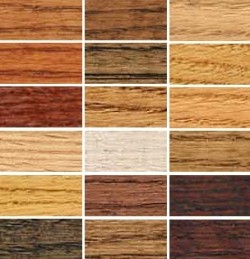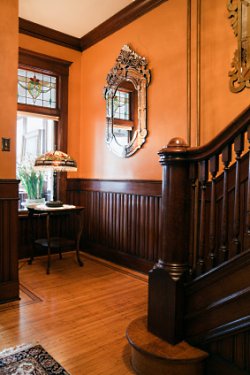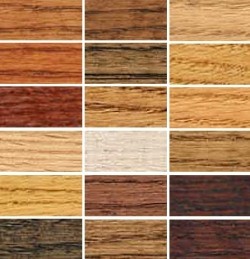 To enliven the interior wood you are refinishing, choose an excellent wood stain color. Although most manufactures have around 20-30 interior wood stain colors this still can be as difficult as deciding on a color to paint a room, but a good decision will make all the difference.
To enliven the interior wood you are refinishing, choose an excellent wood stain color. Although most manufactures have around 20-30 interior wood stain colors this still can be as difficult as deciding on a color to paint a room, but a good decision will make all the difference.
Identify the Species of Wood
Make sure you know the type of wood that you are staining. Different species of wood have different characteristics, colors and densities. Some woods are more porous than others. You get different colors with different species of wood, even using the same stain. Figuring out what wood you are refinishing is the first step to successfully choosing an interior wood stain color.
Samples, Samples and More Samples
 You need to see your new interior wood stain color before committing to the whole project. Reversing the wood stain color is very difficult.
You need to see your new interior wood stain color before committing to the whole project. Reversing the wood stain color is very difficult.
The exact type of wood is needed for your samples. Either order or purchase a few feet more or save sizable scraps. Doing this will save you money and heartache. Apply each stain to a 6-8 inch area and allow to dry completely. Use a pre-stain conditioner for woods that require this treatment.
Once you have narrowed your choices, apply more stain to larger pieces of wood. After it has dried apply your chosen finish. The clear protective wood finish will change the stains color a little bit. Often adding an amber color. Compare these samples to other things used in a room. If you are staining doors, casing and base then compare the color to the walls and flooring. This isn’t like painting. You just can’t restain for a new color, from a pro’s point of view the cost is too high. If you don’t like the color(s) simply start over and make new samples. This is much easier and cheaper.
Find Inspiration for Your Wood Stain Color
You may have an exact idea of what color scheme you want for your room. This isn’t always the case, however. You may be unsure of what colors would work well together. If you are preparing to sell your home, you may want to ensure your new color scheme is with the trends.
Brochures, builder, and interior design magazines and websites are filled with potential options for your room. These sources may inspire you with a look for the wood in your room.
Avoid fixation with any single color. Model homes and cabinets may be very difficult to replicate without knowing what woods and stains were used and how they were applied. Looking at these models should be inspiration so that you can go to a paint or hardware store and share what you are trying to accomplish. There may be techniques you need to use to accomplish a look that is similar to the wood stain you saw in a magazine or on a website.
Notice Color Schemes
 As you look at the color schemes in the brochures, etc. that you collect, you’ll notice that some color schemes are very simple, while others have a lot of different colors. There are five basic color schemes that designers use. You can use them as well.
As you look at the color schemes in the brochures, etc. that you collect, you’ll notice that some color schemes are very simple, while others have a lot of different colors. There are five basic color schemes that designers use. You can use them as well.
Mono-chromatic color schemes stick with one color, for example brown. Everything in the room will be some variation of brown. When working with wood, this is an extremely easy color scheme to work with, especially if you choose earth tones.
Complementary color schemes use colors that opposite each other on the color wheel. For example, if you stare at a bright yellow dot for several minutes, then turn and look at a sheet of white paper, you will see a purple dot appear. This is the complementary color. Complementary color schemes can be bold or subtle depending on how saturated your choice of the color is.
Triad color schemes add more interest to a color scheme. Rather than working with just two colors, you incorporate different proportions of three different colors. Usually for this to work the best, one of the three colors needs to dominate while the other two colors provide even proportions of accents. The color of stain you choose can either emphasize the primary color or prove the accent color.
Tetrad color schemes are the most challenging to pull off. They use four colors. Unless balanced properly, you will grow tired of this type of color scheme very rapidly. The most common area in the home to use a tetrad color scheme is the kitchen where cheerful colors are popular.
Analogic and accented analogic color schemes use three colors that are near each other in the color wheel. The accent, if one is used complements the middle color of the three that are used. The analogic color scheme is almost as easy to use as the monochromatic color scheme, and the results are much more interesting. Accented analogic designs are more complex and need to be used very carefully.
You’ll find using a color scheme designer very helpful in determining which color scheme appeals the most to you.
Choose Stain to Complement
With the wide range of interior wood stain colors available today, you can choose a wood stain color to complement any color scheme you choose. Be sure to test your choice on a scrap of similar wood or on a side that won’t be seen of the wood you are staining.
Staining wood in your house requires careful choices. The right stain will make the wood, and your room, look fantastic.


